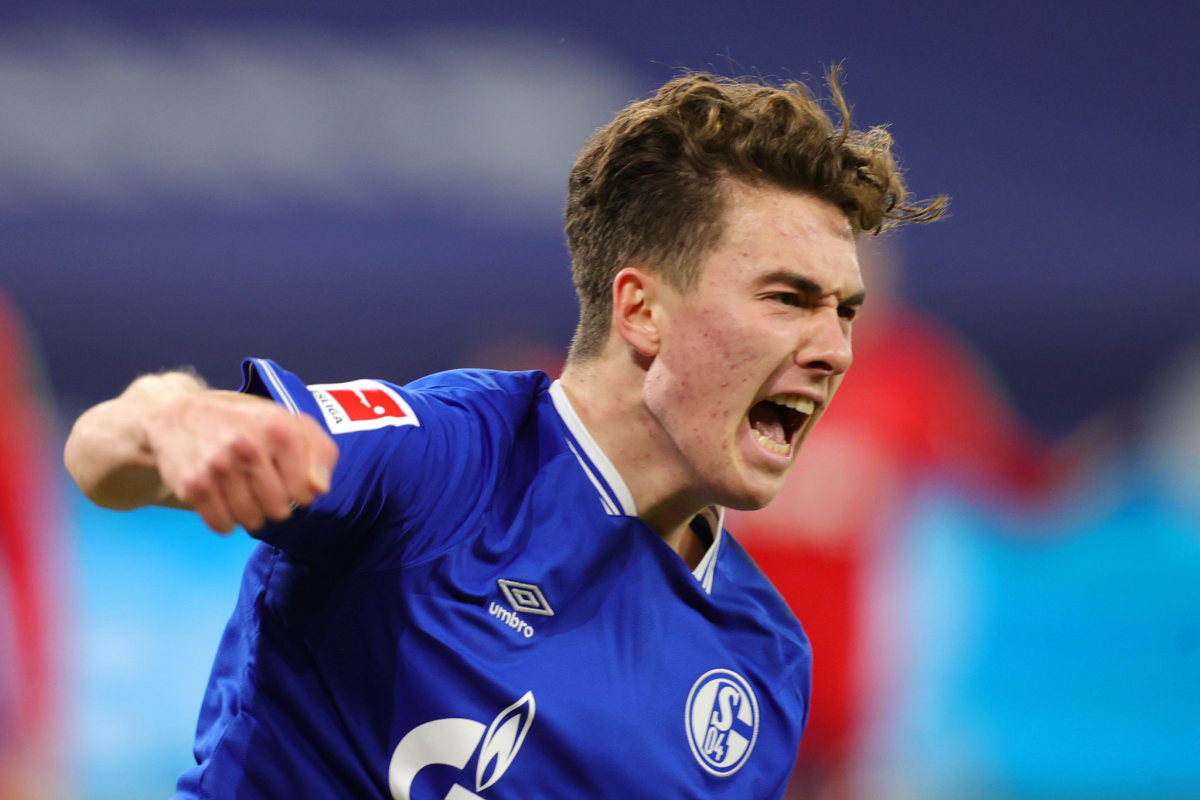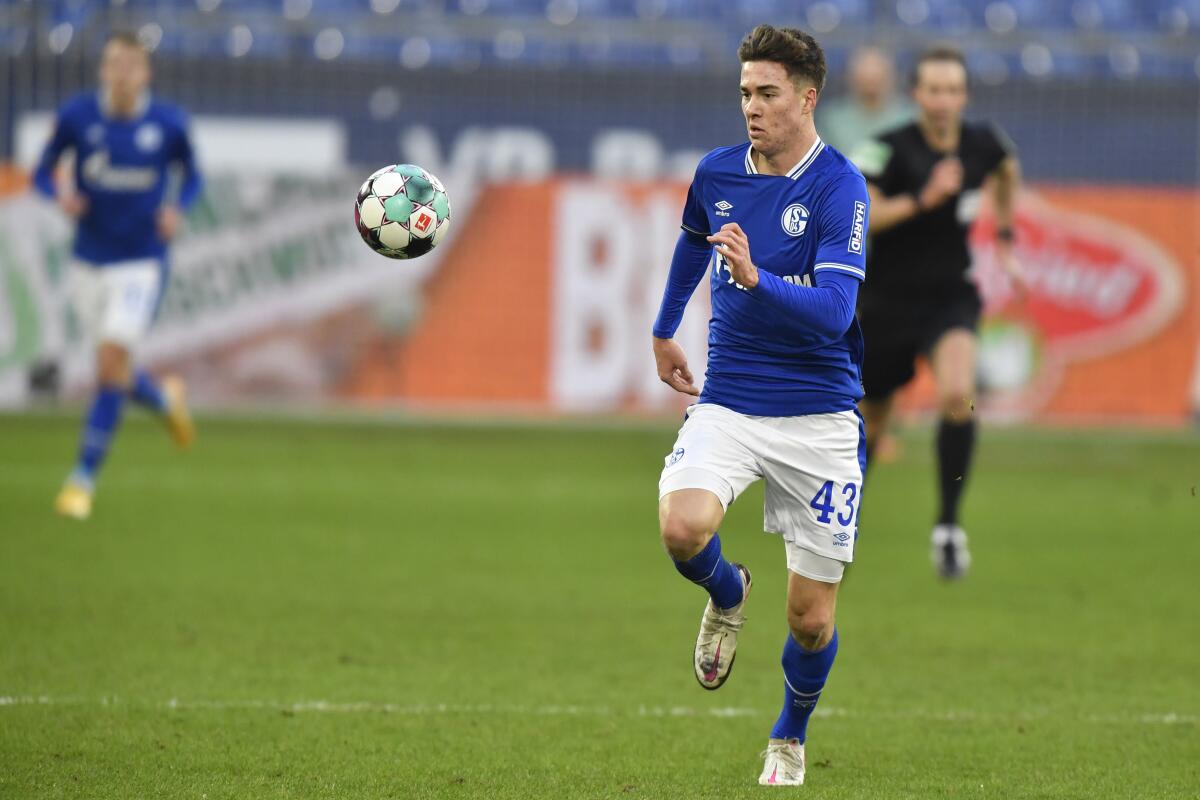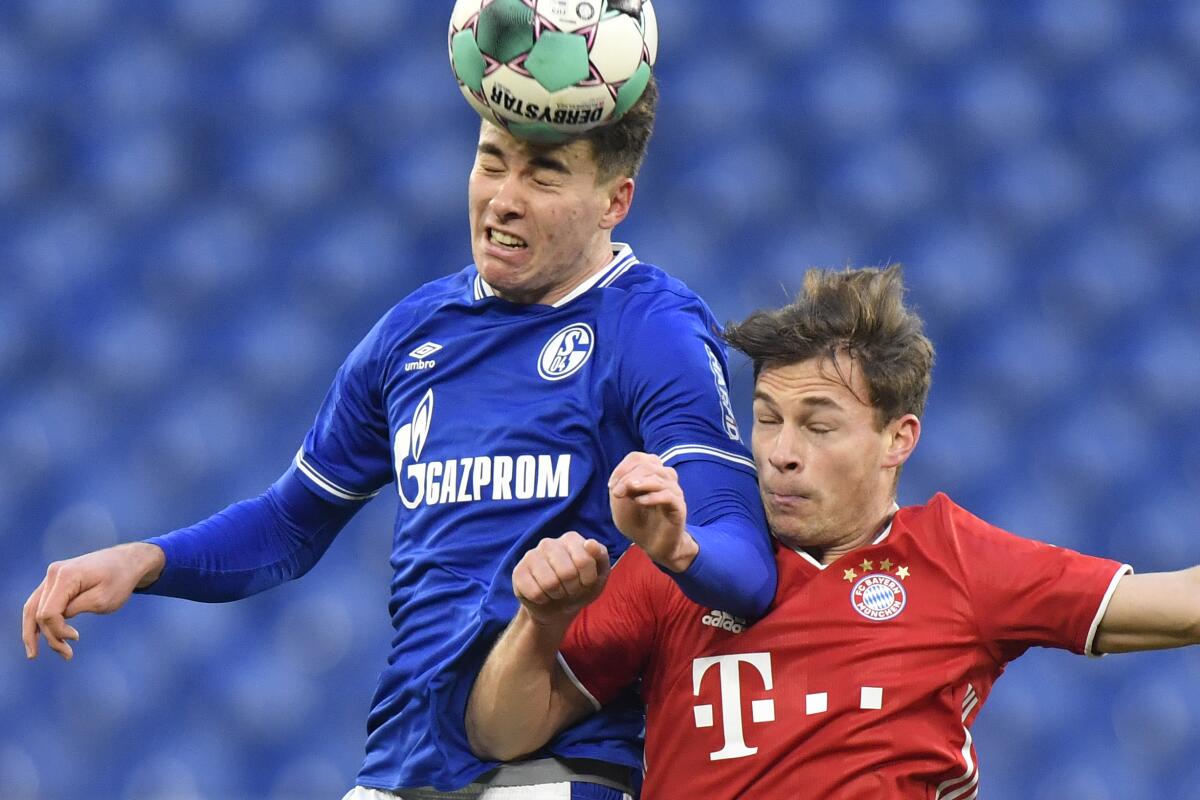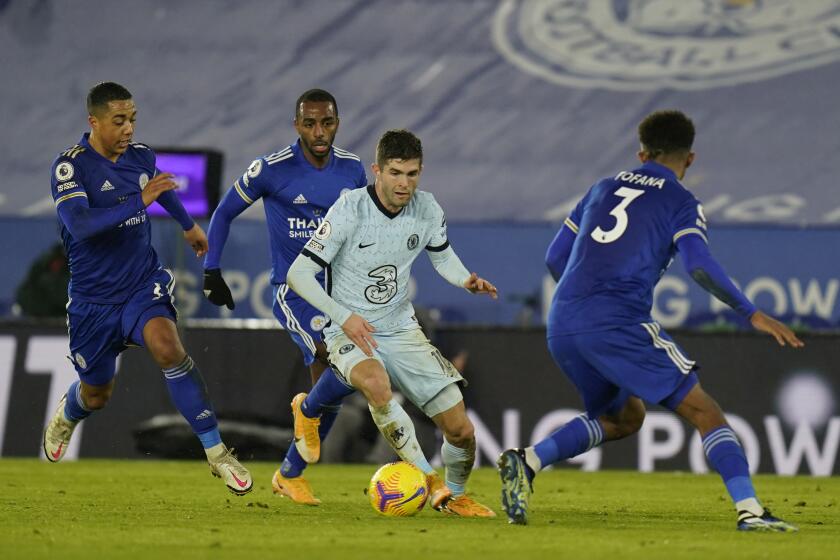Overnight sensation? How Matthew Hoppe went from underdog to Bundesliga standout

- Share via
With his teammate leading a counterattack down the left flank, Matthew Hoppe gestured toward the open space on the near side of the penalty box.
Hoppe broke from his marker’s shoulder and ran on to the slanted pass. Without breaking stride, he calmly chipped the ball with his left foot over the oncoming goalkeeper and into the net.
Only 18 months after moving to Germany, the 19-year-old Hoppe had scored his first goal in the Bundesliga for Schalke’s first team.
He wasn’t finished.
Later in the game, lightning struck again.
And again.
By the end of Schalke’s 4-0 destruction of Hoffenheim, the previously unknown striker from Yorba Linda had become the first American to score a hat trick in Germany’s top soccer league.
“I don’t know how to feel,” a smiling Hoppe said in a televised post-match interview.
In his childhood home on the other side of the globe, his family celebrated. His parents watched a live stream of the game from their bed with his older sister.
America’s young stars continue to excel in European leagues, and the chance to improve their skills overseas will only benefit the U.S. national team.
His father, Tom Hoppe, noted the first goal was scored on the kind of shot he practiced for hours at local parks.
“We do chips all the time,” Tom said in a recent phone interview.
While Matthew was widely viewed as an overnight sensation after that three-goal performance on Jan. 9, his father described his journey as one that required patience. In his early years playing competitive soccer, Matthew was overshadowed by the likes of youth club teammate Efrain Alvarez. As an undersized midfielder, he was cut from the Galaxy’s academy. Until he signed with Schalke, he was never invited to train with any of the U.S.’s age-group national teams.
“He’s always been a little bit of an underdog,” Tom said.
Not anymore. Matthew followed his hat trick by scoring in his next game against Frankfurt and again in his game after that against Koln. The five goals he scored in that three-game stretch made him the talk of American soccer, as he has emerged as a potential solution for the national team’s longstanding problems at center forward.
“It’s great to see him reach these heights and now he has to maintain it,” U.S. coach Gregg Berhalter said in a videoconference. “If he does that, I’m sure he’ll get an opportunity with the national team.”
The possibility of Hoppe becoming the No. 9 for the U.S. was nonexistent until about 2½ years ago and not only because of his low profile.

Most players drop back in the field as they grow older and the competition improves.
Hoppe, who was a midfielder for most of his life, is a rare exception who moved in the opposite direction.
He was late in developing the 6-foot-3 frame that provides him with the necessary physicality to play up front. His father estimates that he was around 5-4 when he started his freshman year at Yorba Linda High.
“Some of these kids hit their peak at 13,14,” Jimmy Nordberg said. “Matthew was definitely not that kid.”
Nordberg started coaching Hoppe when he was 9 or 10 years old on a youth club that was affiliated with a reincarnated version of the North American Soccer League’s New York Cosmos.
Hoppe wasn’t the best player on the team — or even the best player in the midfield.
The designation belonged to Alvarez, the current Galaxy attacker. Alvarez, who was born a year after Hoppe and playing up an age group, made his first national team at 12 and signed his first professional contract at 15.
Nordberg described Hoppe as an intelligent and technically sound player.
“He was a very hard worker,” Nordberg said. “He put his head down and kept working.”
MLS added a new element to talks with its players association on a new CBA by authorizing a lockout if a deal isn’t reached by midnight Thursday.
With Alvarez and Hoppe as the team’s playmakers, Nordberg said with a chuckle, “We didn’t lose a lot of games.”
Alvarez eventually moved on to the academy of Chivas USA, the Major League Soccer team that drafted his older brother. Hoppe later joined the Galaxy’s youth setup.
But Chivas USA disbanded after the 2014 season. Many of its academy players, including Alvarez, subsequently switched to the Galaxy. Hoppe was let go.
“There wasn’t any room for him,” Tom said.
As painful as it was for Hoppe to be cut by the Galaxy, his father said that in retrospect, the move placed the boy on the track to be where he is now.
“We’re Christians,” Tom said. “We think everything happens for a reason.”
The setback resulted in a move to the Irvine Strikers, where he played under famed youth coach Don Ebert, who, in turn, introduced him to German soccer.
Under Ebert, the captain of the 1980 U.S. Olympic soccer team, Hoppe continued to play in the midfield but was scoring regularly against older competition.
“His timing of runs is the best I’ve seen as a youth player,” said Ebert, who compared that ability to that of another of his former players, U.S. national team striker Bobby Wood.
Ebert thought enough of Hoppe to invite him on a two-week tour of Germany as part of a small group of Strikers players from various age groups. The trip included training sessions with a number of Bundesliga teams.
“The reason you take kids over there is that sometimes the light goes on,” Ebert said. “They see it, they touch it and they want it.”
Which is what happened to Hoppe.
“I want to make it here,” Ebert recalled Hoppe telling him.
The shift in mind-set resulted in Hoppe’s first major move, which was to Barcelona’s U.S.-based residency academy in Casa Grande, N.M.

Tom had reservations about letting his son leave home at 16. Leading up to the tryout, however, Tom read a republished magazine story about former USC pitcher Bruce Gardner, who died of a self-inflicted gunshot wound. Near his body on the USC baseball field were his All-American plaque, college diploma and a suicide note, in which he blamed Rod Dedeaux for convincing his mother to force him to remain in school rather than accept a $66,500 bonus to sign with the Chicago White Sox after his freshman year.
The story affected Tom, who said, “I didn’t want Matthew to come to me and say, ‘I should have gone to Casa Grande.’ ”
There was another chance occurrence at the tryout. Hoppe wasn’t on the list of invited players, according to his father. “Go play striker,” one of the evaluators told him.
Hoppe scored twice in the first 10 minutes. He didn’t know it at the time, but he had found a new position. Hoppe was now a 6-footer and the Barcelona Academy developed him as a striker. Playing alongside current Galaxy defender Julian Araujo, he became the leading scorer of the U.S. Soccer Development Academy, a network of academies and youth clubs across the country.
“He blew up physically,” San Diego State coach Lev Kirschner said.
With the help of assistant coach Josh Hill, Kirschner convinced Hoppe to sign with the Aztecs. But Hoppe never played for him.
In the summer of 2019, Hoppe went to a couple of tryouts in Germany, including a trial with Schalke that resulted in a contract.
MLS will open its season in April instead of its traditional March date because of coronavirus concerns, although CBA negotiations must be finalized.
He played his first season in Germany with the club’s under-19 team, after which he was promoted to the reserves.
Hoppe scored only once for the reserves in 16 games, but with Schalke in last place in the Bundesliga, he was granted an opportunity to play for the first team. He made his first team debut in November. The game in which he scored the hat trick was only his third start.
The game changed everything.
The number of interview requests Schalke received for Hoppe prompted the Bundesliga to schedule a videoconference with U.S. reporters last week. The virtual roundtable was postponed.
When Tom visited Germany this month, he found his son’s image everywhere, from television screens to newspapers. Schalke’s hometown of Gelsenkirchen was on lockdown, but Tom said it wasn’t uncommon for Matthew to be stopped by strangers.
“It’s funny seeing when people in Germany ask to take pictures with him or get autographs,” Tom said.
Matthew Hoppe isn’t anonymous anymore. He hasn’t found the net in each of his last two games, but if he resumes scoring, if he becomes the U.S.’s top choice striker and the Americans make a run in the World Cup next summer, he could soon be as famous in his home country as he has become in his adopted one.
More to Read
Go beyond the scoreboard
Get the latest on L.A.'s teams in the daily Sports Report newsletter.
You may occasionally receive promotional content from the Los Angeles Times.








